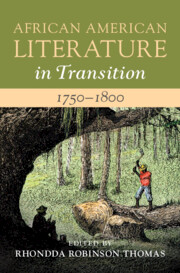Book contents
- African American Literature in Transition, 1750–1800
- African American Literature in Transition
- African American Literature in Transition, 1750–1800
- Copyright page
- Contents
- Contributors
- Preface
- Chronology
- Introduction
- Part I Limits and Liberties of Early Black Print Culture
- Part II Black Writing and Revolution
- Part III Early African American Life in Literature
- Part IV Evolutions of Early Black Literature
- Chapter 10 Black Authors and British National Identity, 1763–1791
- Chapter 11 The Competing Demands of Early African American Literature
- Chapter 12 Black Letters Close the Eighteenth Century
- Index
Chapter 10 - Black Authors and British National Identity, 1763–1791
from Part IV - Evolutions of Early Black Literature
Published online by Cambridge University Press: 01 April 2022
- African American Literature in Transition, 1750–1800
- African American Literature in Transition
- African American Literature in Transition, 1750–1800
- Copyright page
- Contents
- Contributors
- Preface
- Chronology
- Introduction
- Part I Limits and Liberties of Early Black Print Culture
- Part II Black Writing and Revolution
- Part III Early African American Life in Literature
- Part IV Evolutions of Early Black Literature
- Chapter 10 Black Authors and British National Identity, 1763–1791
- Chapter 11 The Competing Demands of Early African American Literature
- Chapter 12 Black Letters Close the Eighteenth Century
- Index
Summary
This chapter explores how transatlantic Black authors responded to transitional British national identity in the decades surrounding the American Revolution. It examines some of the conflicting discursive and cultural elements of African, American, and British identities as each of these emerged in new forms during the mid- to late eighteenth century. Examining evangelical and political work by Ukawsaw Gronniosaw, Phillis Wheatley and Ottobah Cugoano, it emphasizes sensitivity to the prevalence of “Britishness” in the construction of early “African American” narratives of identity and belonging. While the “middle passage” loomed large as the most traumatic transatlantic migration in the eighteenth-century African American literary tradition, moving from west to east also generated considerable economic, social, and political anxieties and prompted a range of intellectual responses. As they would in the nineteenth century, many Black writers in America saw Britain as a beacon of liberty, Christian morality, and fairness. When they arrived, they often found that the reality did not match their expectations. This chapter therefore examines Black intellectual responses to, and constructions of, British national identity narratives during decades of significant transition.
Keywords
- Type
- Chapter
- Information
- African American Literature in Transition, 1750–1800 , pp. 257 - 280Publisher: Cambridge University PressPrint publication year: 2022



